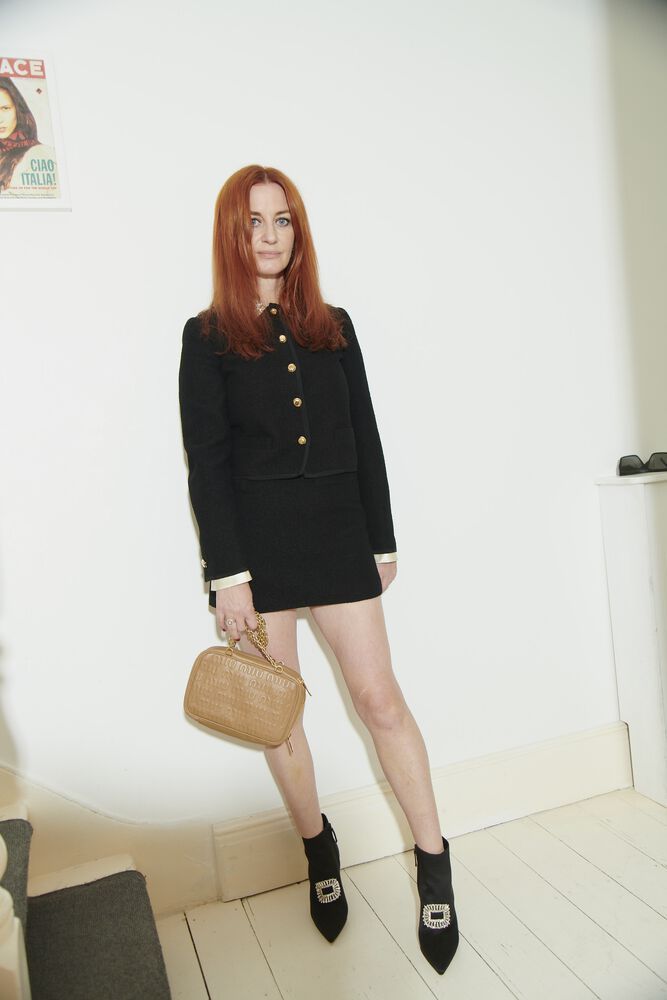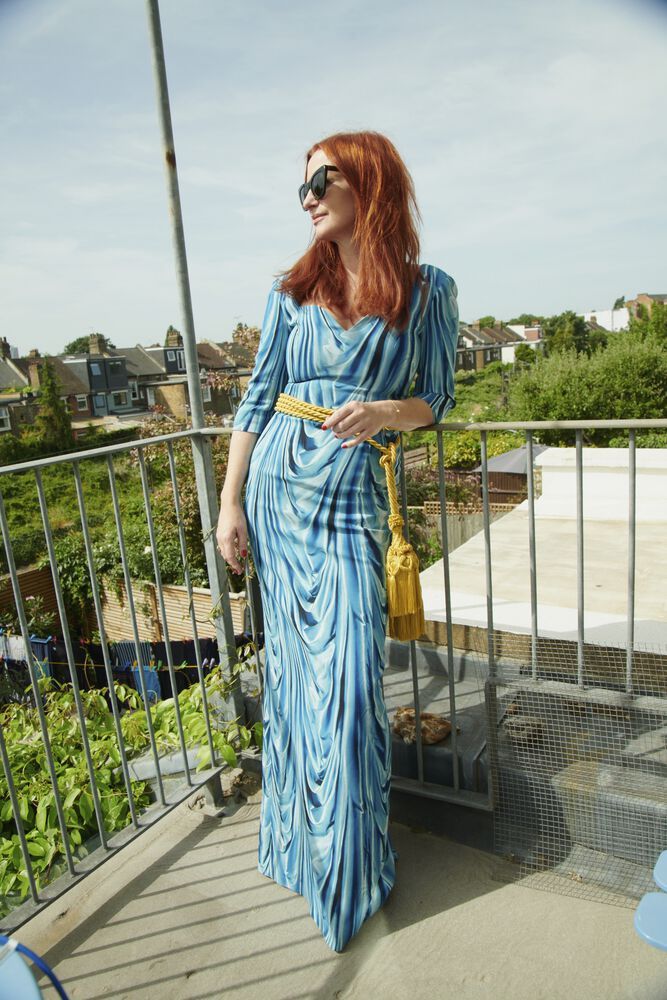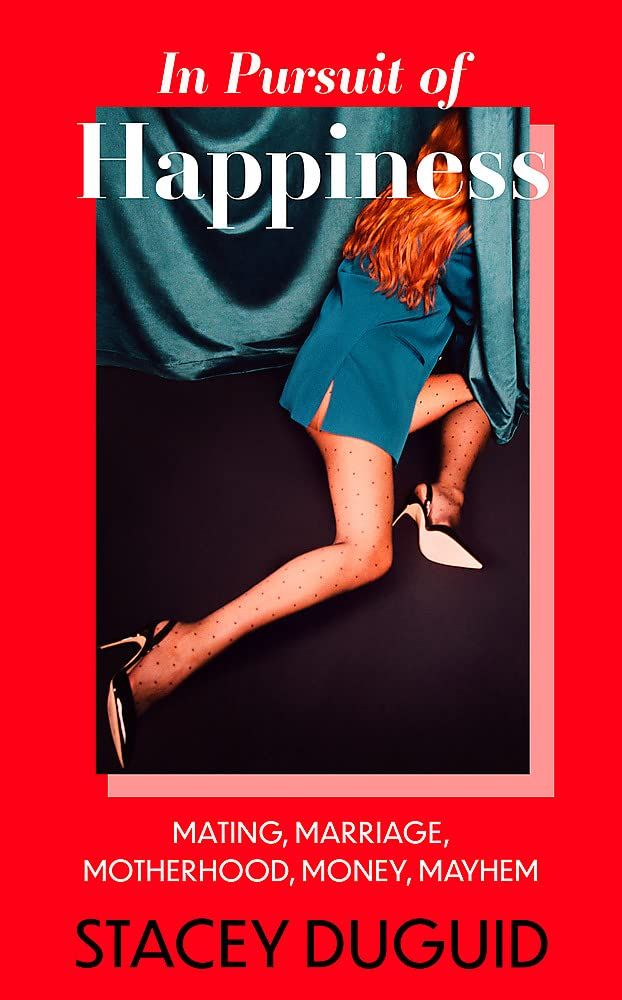On my 44th birthday, my then husband took me away for the weekend to a snazzy new hotel, The Fife Arms. A former coach-tour hotel I'd visited as a child now transformed by art behemoths Hauser & Wirth, it was walking into the hotel that weekend that gave me the idea I hoped would secure my financial future: what if I were to buy my own property nearby, with a view to developing it into an Airbnb?
Despite being two decades into a career with two young children, the sad reality was that I still had no savings or pension. In my early 20s, I’d chosen a career in fashion on a salary that barely covered the cost of living in London because I loved it and was good at it – all the while accepting the fact that the industry’s version of a pay rise was free handbags or expensive moisturisers.
I’d spent the past few years trying to maintain my career amid the maelstrom of motherhood, defeated by the knowledge that it was my husband who paid for our lives. It was a set-up that felt completely incongruous to my working-class background growing up in Scotland, seeing my mother work three jobs to keep the household afloat.

Although nobody ever said it, when working in fashion, ‘looking the part’ felt somehow part of our contracts – as if written in invisible ink. And so I shopped, buoyed by new-season ‘workwear’ and vodka, maxing out credit cards and dipping lower into my overdraft. If lipstick and hairspray were my mother’s armour in Ashton-under-Lyne, designer clothes and expensive shoes were mine at Paris Fashion Week.
It was when I reached my 40th birthday that I realised I was no closer to a disposable income or financial independence than I had been in my 20s. Why it took another four years to have my epiphany at The Fife Arms, I don’t know – perhaps it was the fact that, by then, my children were in school and I could make some different decisions about my future.
And so, a few months after our mini-break, I secured my first-ever corporate job with a decent salary. At the same time, I learned that I could finally get my own chunky-sized mortgage, and flew back to Aberdeen alone to make an offer on a five-bedroom bungalow in Braemar. For some reason, the ‘master plan’ I had conjured up while sipping something a bit too strong in an expensive hotel now felt totally viable. Disempowered as I was by my financial status within the household, even keeping the secret to myself made me feel more alive.
Back at home, as we chopped vegetables for a stir-fry, I blurted out the news to my husband: ‘I’ve found a house, made an offer on it and it’s been accepted. I’ve secured the mortgage... it’s in Braemar, Scotland!’
The second bombshell was still to come: ‘All I need is to take 60k out of the equity in this house to use as a deposit...’
Needless to say, all hell broke loose that night (it may come as no surprise that the deposit was also denied). And in the months that followed, the underlying issues in our marriage – things we had battled for years and spent a year in couples therapy trying to dissect – came to a head.
To this day, I hold up my hands: making an offer on the Scottish house was not the smartest move of my life. Even now (five years of therapy later), I still can’t quite fully fathom why I went about trying to buy a second property in such a haphazard, hurtful way.
But what I have come to realise is that my relationship with money was not healthy, and that I have spent my life treating the subject like a dark cave that I’ve been skirting along the edges of. I entered a relationship completely unable to communicate with my partner about my lack of financial agency and what that meant (among other things, never feeling quite ‘at home’ in the house I helped choose and renovate but only owned 4% of).
But there are other factors too – my working-class background, the underpaid job. Plus the fact that women in my family and friendship circles don’t generally talk about money, despite the fact the responsibilities they take on in motherhood might mean they’re facilitating a partner’s career and pension pot rather than their own.
Now 50 and divorced, I’m in a much better financial place – but I wouldn’t have been without some crucial lessons along the way. Here’s what I’ve learned...
Your relationship with money begins in childhood
It took me a long time to realise that it was the constant trill of my mother saying, ‘Your father hasn’t paid any money into my account,’ that kick-started a lifetime of self-hate, self-doubt and self-sabotage when it came to money. When my mother told me each month my father hadn’t paid child support, I not only internalised the idea that I was unlovable, but also that not having money made me feel unwanted, discarded, ashamed. The child me felt worthless and, as a result, the older me hated everything to do with money.
I’ve self-sabotaged many times over the years – a classic example being not putting tax money aside, then having a panic attack come January. I found written in an old notebook the other day: ‘March 2005. I’m in a lot of debt, £35,000 to be exact. I don’t know how it happened, I don’t know who to talk to. And yet I have a physical need to keep shopping. I’m terrified.’ I bought everything, because expensive clothes and nights out made me feel valued. Therapy has helped me to unpick this.
When my kids were little, I spent far too much money on them, A) as a rebellion against my own upbringing; and B) because I felt guilty for working. When I was covering a maternity leave position for a year at Net-a-Porter, I brought them home a small teddy after work each night. What kind of example does that set? I shudder at the memory now. The apple doesn’t fall far from the tree, and I don’t want them to have a broken relationship with money.
It is possible to save in your 20s
My 20s were a mess for many reasons, but at the heart of all the chaos was addiction: love addiction, shopping addiction, going out and getting high addiction... I could go on.
In 1996, I moved to London with zero money, knowing no one and took three jobs: one in a bar three evenings a week, a weekend job at Harvey Nichols and an unpaid internship at a PR agency. Of course, if I could do it all again, I’d understand that although the job I was pursuing in fashion PR would eventually lead to my dream job working at ELLE magazine, it would pay little more than my rent. I still remember a man in a grey suit coming to the office to talk about pensions – I refused to surrender a slither of cash towards a future I might not be alive to see.
In my 40s, I’ve managed to wean myself off the dopamine hit of newness and have stopped shopping for clothes – I don’t need any new clothes and if I do, I borrow things from friends. I also no longer buy food on a weekly delivery basis and instead prefer to shop daily.
In truth, it’s only since losing the corporate job and leaving our lovely family home that I’ve learned how to live on far less, but we should be teaching this stuff in school. Financial freedom is a woman’s only true freedom: it allows us to pursue our dreams, or, in my case, leave a family home, and I wish I had known that. All that money spent on stuff I never needed makes me feel sick, and if I hadn’t done that, I’d be in a much better position.

Marriage begins with a joint bank account
Did someone say get your salaries paid into the same account? No, they didn’t. We kept things firmly separate.
I earned my money and if I could that month, I’d add some to a joint account opened solely for direct debits and nothing else. In doing this we created a very visceral financial imbalance in our relationship – my account was always empty, while he paid for things I couldn’t afford, to maintain a lifestyle I couldn’t afford, that my inner child in turn told me I wasn’t worthy of.
If I’m brutally honest, for me it was this that swung the pendulum towards divorce. Left unspoken, the gulf between our earnings caused problems and too often I bumbled along, ignoring the elephant in the room. Was there a way to match his fiscal input towards our outgoings? No, it wouldn’t have been possible: one of us had to be around the children and it was me who took on that unpaid role. Given I couldn’t see my contribution to the household, how on earth could I place any value on my role within it?
Had I known what I know now then, I would also have approached the purchase of our home differently: never would I have agreed to anything less than being joint owners of a property, and if that meant living in a smaller flat, so be it.
I wish I’d been able to discuss money with my ex-husband and wish I’d got help in the form of therapy far sooner. Now I’m able to bring up subjects such as, ‘How do we plan to split the cost of this flight, hotel, lunch?’ with a partner.
Keep your hand in at work when you have kids
Even when the kids were tiny, I kept my career going. I had to, not just for my sanity, but I knew what would be around the corner if I didn’t: I’d disappear off the face of the journalistic earth and never work again.
Frustratingly, the childcare cost the same as my salary – give or take a couple of hundred quid – but I had to work for the sake of my future. Although I had returned to work full-time after my first child, after my second I was freelance and with a dramatically reduced income. As a result, I could afford less childcare and took on the majority of domestic responsibilities. The problem with this was that I failed to recognise the unpaid work of motherhood – and devalued myself and my role as a result.
When I got the corporate job, the imbalance of fiscal power shifted. Finally able to save and contribute towards the household in a more meaningful way, I could look to my future and ask myself the question: ‘Do I go now, or do I stay?’
The fact is, if I hadn’t kept my hand in, the corporate job may not have come calling; and if I had stayed at home full-time to look after my children, my financial freedom would have been well and truly curtailed. ‘Hi honey, I’m gonna leave you, so can you please transfer £10k into my account?’ Said no one ever.
A ‘good’ divorce depends on your maths
When it came to divorce, I didn’t think about who would move out, or where I would live. Don’t assume for a second the other party (divorce schpeak) will be packing their bags, and if they do, will you be able to afford the cost of running the home? Often couples end up living together until the divorce is underway and a financial settlement has been agreed. But what if there’s nothing to divide? No equity, no savings, no pensions...
Before even mentioning the D word, my advice would be to write it down– ALL OF IT. If only I’d spent time working out how much it costs to hire a lawyer (I spent £30k and got precisely nowhere) or how much it costs to finally get to a settlement figure. It didn’t help that I didn’t understand what my ex earned or the meaning of bonuses, benefits in kind, long-term incentive plans. Nor did I have a document that listed all the joint and sole savings, investments, properties and debts (otherwise known as a schedule of assets).
In the end, unable to pay the legal bills, I self-represented but had no clue what my income vs outgoings would look like post-divorce and no idea how much I could borrow to buy a home. As for knowing my projected retirement income, forgetaboutit.
In the end, I ‘negotiated’ just enough to start again, albeit with a mortgage. I bought a house (secured before the horrendous increase in interest rates) and, thanks to that mortgage, went onto buy a second property – a very small, run-down house in Menorca. One day, I might just have that retirement fund.



Post a Comment
0Comments